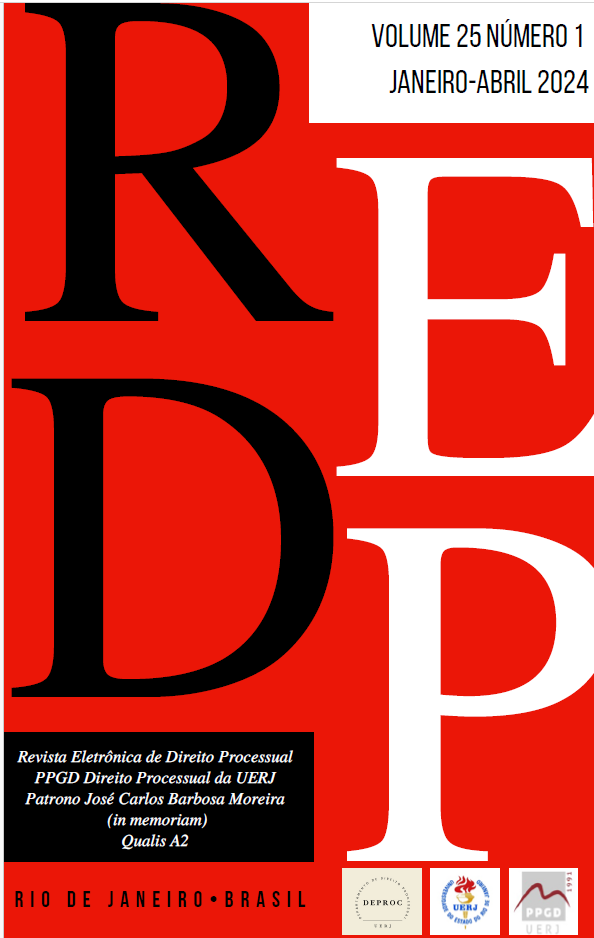O ESTATUTO DO MAIOR ACOMPANHADO NO SISTEMA PORTUGUÊS - ALGUMAS QUESTÕES PROCESSUAIS
DOI:
https://doi.org/10.12957/redp.2024.81908Resumo
A significativa mudança de paradigma, provocada pela edição da Lei 49/2018, que internalizou os termos da Convenção de Nova York ao introduzir no ordenamento jurídico português o processo especial de acompanhamento de maior, torna necessária a realização de uma profunda reflexão sobre as condições de possibilidade teórico-normativas para uma adequada configuração do instituto orientada ao seu aproveitamento e melhor efetivação, temas que constituem o objeto do presente estudo. Com a acelerada modificação do status demográfico das sociedades contemporâneas e a deterioração das condições de seguridade e de assistência socioafetiva, a busca pela preservação da capacidade jurídica e do exercício da autonomia pelo próprio indivíduo que, por razões de saúde, deficiência ou pelo seu comportamento, se encontre impossibilitado de exercer pessoal, plena e conscientemente os seus direitos ou de cumprir os seus deveres, o que configura importante desafio aos estudos teórico-dogmáticos e aos operadores práticos do direito. Há uma especial preocupação pelos magistrados e advogados, envolvidos diretamente no processo de acompanhamento, mas que é também extensiva a toda a sociedade. A nova legislaçao levanta o problema dsa condições do exercício da autonomia individual em situação de dificuldadades pessoais, tema que pode ser melhor compreendido por meio de uma análise intrínseca ao ordenamento jurídico português e comparativa. O presente estudo tem como ponto de partida a contextualização e evolução do regime das incapacidades, a nível internacional e nacional, para compreender as alterações processuais inerentes à aplicação de medidas de acompanhamento pela via judicial. No que se refere ao processo, é apreciada, em especial, a sua natureza e caracterização, e são expostos os princípios processuais que enformam os poderes do juiz, ao que se segue a análise de alguns aspectos da tramitação do processo. A exposição tem por base o regime jurídico vigente, a posição da doutrina e algumas decisões jurisprudenciais de referência.
Downloads
Publicado
Como Citar
Edição
Seção
Licença
Copyright (c) 2024 Lurdes Varregoso Mesquita

Este trabalho está licenciado sob uma licença Creative Commons Attribution 4.0 International License.
Todos os artigos publicados na Revista Eletrônica de Direito Processual (REDP) (Departamento de Direito Processual, Universidade do Estado do Rio de Janeiro, Brasil) são licenciados por meio de uma Licença Creative Commons - Atribuição 4.0 Internacional (CC BY 4.0).
Os autores retêm os direitos autorais de seu artigo e concordam em licenciar seu trabalho com a licença CC BY 4.0, aceitando assim os termos e condições específicos desta licença disponíveis no seguinte website: https://creativecommons.org/licenses/by/4.0/legalcode.
- Os autores concedem à REDP o direito de primeira publicação, de se identificar como publicadora original do trabalho e concedem à revista uma licença de direitos não exclusivos para utilizar o trabalho das seguintes formas: Reproduzir, vender e distribuir cópias eletrônicas ou impressas do manuscrito como um todo, de partes específicas do manuscrito e de suas traduções para qualquer idioma;
- O uso do artigo por terceiros é livre, contanto que a integridade da publicação seja mantida e seus autores originais, periódico de primeira publicação e detalhes de citação sejam identificados.
Dentro dos termos da licença, os autores podem entrar em acordos contratuais adicionais separados para a distribuição não exclusiva da versão publicada do trabalho na revista.
Copyright and Licensing
All articles published in the Procedural Law Electronic Review (REDP) (Department of Procedural Law, State University of Rio de Janeiro, Brazil) are licensed under a Creative Commons License - Attribution 4.0 International (CC BY 4.0).
- Authors retain copyright to their article and agree to license their work under the CC BY 4.0 license, thereby accepting the specific terms and conditions of this license available at the following website: https://creativecommons.org/licenses/by/4.0/ legal code.
- Authors grant REDP the right of first publication, to identify itself as the original publisher of the work, and grant the journal a non-exclusive license to use the work in the following ways: Reproduce, sell and distribute electronic or printed copies of the manuscript as a whole, of specific parts of the manuscript and its translations into any language;
- Use of the article by third parties is free, as long as the integrity of the publication is maintained and its original authors, first publication journal, and citation details are identified.
Within the terms of the license, authors may enter into separate additional contractual agreements for the non-exclusive distribution of the published version of the work in the journal.




